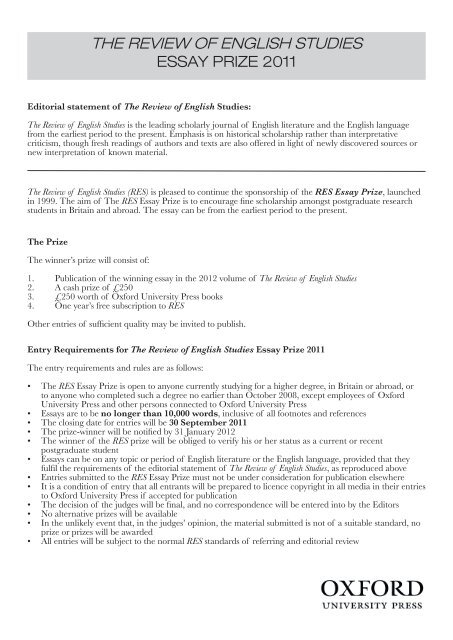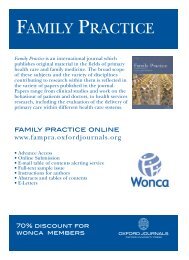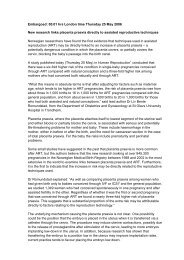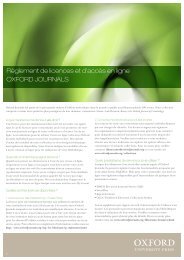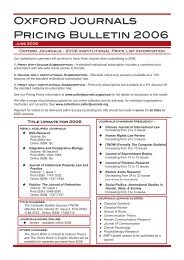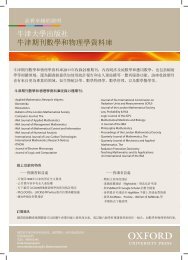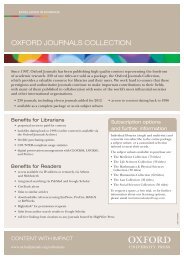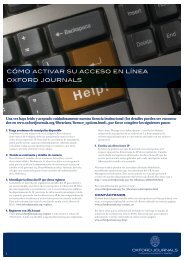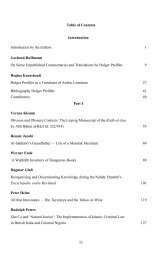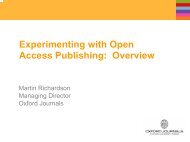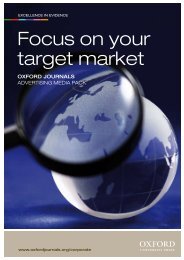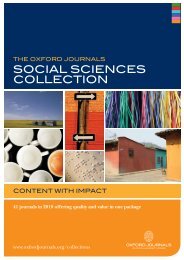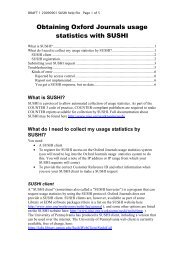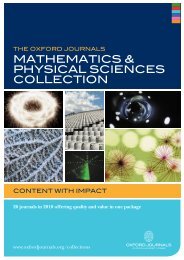THE REVIEW OF ENGLISH STUDIES - Oxford Journals
THE REVIEW OF ENGLISH STUDIES - Oxford Journals
THE REVIEW OF ENGLISH STUDIES - Oxford Journals
You also want an ePaper? Increase the reach of your titles
YUMPU automatically turns print PDFs into web optimized ePapers that Google loves.
<strong>THE</strong> <strong>REVIEW</strong> <strong>OF</strong> <strong>ENGLISH</strong> <strong>STUDIES</strong><br />
ESSAY PRIZE 2011<br />
Editorial statement of The Review of English Studies:<br />
The Review of English Studies is the leading scholarly journal of English literature and the English language<br />
from the earliest period to the present. Emphasis is on historical scholarship rather than interpretative<br />
criticism, though fresh readings of authors and texts are also offered in light of newly discovered sources or<br />
new interpretation of known material.<br />
The Review of English Studies (RES) is pleased to continue the sponsorship of the RES Essay Prize, launched<br />
in 1999. The aim of The RES Essay Prize is to encourage fine scholarship amongst postgraduate research<br />
students in Britain and abroad. The essay can be from the earliest period to the present.<br />
The Prize<br />
The winner’s prize will consist of:<br />
1. Publication of the winning essay in the 2012 volume of The Review of English Studies<br />
2. A cash prize of £250<br />
3. £250 worth of <strong>Oxford</strong> University Press books<br />
4. One year’s free subscription to RES<br />
Other entries of sufficient quality may be invited to publish.<br />
Entry Requirements for The Review of English Studies Essay Prize 2011<br />
The entry requirements and rules are as follows:<br />
• The RES Essay Prize is open to anyone currently studying for a higher degree, in Britain or abroad, or<br />
to anyone who completed such a degree no earlier than October 2008, except employees of <strong>Oxford</strong><br />
University Press and other persons connected to <strong>Oxford</strong> University Press<br />
• Essays are to be no longer than 10,000 words, inclusive of all footnotes and references<br />
• The closing date for entries will be 30 September 2011<br />
• The prize-winner will be notified by 31 January 2012<br />
• The winner of the RES prize will be obliged to verify his or her status as a current or recent<br />
postgraduate student<br />
• Essays can be on any topic or period of English literature or the English language, provided that they<br />
fulfil the requirements of the editorial statement of The Review of English Studies, as reproduced above<br />
• Entries submitted to the RES Essay Prize must not be under consideration for publication elsewhere<br />
•<br />
It is a condition of entry that all entrants will be prepared to licence copyright in all media in their entries<br />
to <strong>Oxford</strong> University Press if accepted for publication<br />
• The decision of the judges will be final, and no correspondence will be entered into by the Editors<br />
• No alternative prizes will be available<br />
• In the unlikely event that, in the judges’ opinion, the material submitted is not of a suitable standard, no<br />
prize or prizes will be awarded<br />
• All entries will be subject to the normal RES standards of referring and editorial review
<strong>THE</strong> <strong>REVIEW</strong> <strong>OF</strong> <strong>ENGLISH</strong> <strong>STUDIES</strong> ESSAY PRIZE<br />
INSTRUCTIONS TO AUTHORS<br />
1. Submissions<br />
Submissions for the essay competition must arrive no later than 30 September 2010.<br />
Please send your entries via the online submission system which you can find from the journal’s homepage<br />
at www.res.oxfordjournals.org. Click on the ‘Submit Now’ link and select ‘Essay Prize’ from the drop-down<br />
menu in the ‘Manuscript Type’ box. If you need assistance regarding the online submission system, please<br />
click on the ‘Online Submission Instructions’ link.<br />
It is the responsibility of the author to secure permission for the reproduction of illustrations and quotations<br />
from copyrighted material.<br />
2. Presentation<br />
a) Manuscripts<br />
•<br />
•<br />
All material should be double spaced; leave ample margins (unjustified to the right) and number pages<br />
consecutively.<br />
An abstract of about 200 words summarizing the main points of the submission should appear before<br />
the main text commences. When you submit your entry using the online submission system, please<br />
ensure you include your abstract in the separate box and also at the start of your essay. The abstract of<br />
the prize-winning essay will appear both in the journal and online.<br />
• Number footnotes consecutively throughout the paper. Type the footnotes in double spacing at the end<br />
of the manuscript, commencing on a separate sheet. An initial unnumbered footnote may be included<br />
giving brief acknowledgements.<br />
3. Style<br />
Contributions will be edited in the house style of RES. References should be used sparingly, and follow the<br />
models:<br />
For books:<br />
L. Danson, Wilde’s Intentions: The Artist in his Criticism (<strong>Oxford</strong>, 1997)<br />
For articles:<br />
D. Price, ‘Reconsidering Shakespeare’s Monument’, The Review of English Studies, 48/190 (May 1997)<br />
Subsequent references should use surname and short title (not ‘op. cit.’ or author’s surname only).<br />
For a full style guide, please refer to Hart’s rules.<br />
General enquiries about the competition should be addressed to the General Editor, Thomas Keymer, at<br />
thomas.keymer@utoronto.ca


